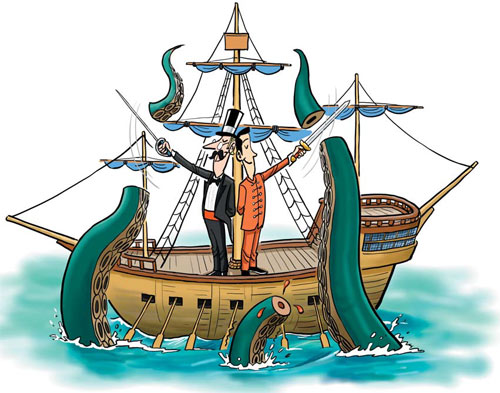Build on security initiatives
Updated: 2011-05-20 10:34
By Miwa Hirono (China Daily European Weekly)
|
 |
China and Europe must put ideological differences aside and seize clear opportunities for cooperation to fight non-traditional security threats
As we witness new forms of conflict, the nature of global security is changing. Intra-state conflicts and crises in the Middle East and Africa, pirate attacks in the Gulf of Aden and terrorist attacks around the world - collectively known as non-traditional security issues - represent increasingly imminent threats to peace and stability in our neighboring regions, and in turn, to our political and economic activities.
The ongoing conflict in Libya is a case in point. Chinese and European workers have been forced to flee the country, leading to a huge loss of business. Instability in the resource-rich regions of the Middle East and Africa is likely to disrupt political and economic operations around the world.
Pirate attacks in the Gulf of Aden pose another challenge. About 80 percent of all trade with Europe moves through the Gulf of Aden, including one-third of the continent's oil supplies. It is also a corridor for Chinese imports. Attacks on ships, resulting in disruption of trade, could have a very serious impact on the Chinese and European economies, and on global commodity prices.
Challenges and opportunities
Non-traditional security issues are invariably global problems, beyond the capacity of any single country to solve, and tackling them requires in-depth international cooperation between multiple countries.
Multinational cooperation between military forces is particularly important. The application of military power is one way of dealing with security on the ground when conflicts arise. When multiple national interests are at stake, military forces from different states are likely to operate side by side.
Rehearsing joint, combined, inter-agency and other forms of interaction among militaries before they are needed is absolutely essential to improving the efficiency of joint operations such as peacekeeping and anti-piracy escort missions.
China and Europe, however, have vastly different foreign policy stances on major global security issues. Ideological rifts have been further exposed through the international community's response to the Libyan crisis, with China criticizing NATO bombing missions.
Indeed, how to achieve the right balance between the protection of civilians and the principle of the minimum use of force in peace operations is one of the central questions dividing China and Europe. To add further complexity, Middle Eastern and African states also have a diverse array of perspectives on the issue.
Critics might question how China and Europe can cooperate when they have divergent international political priorities. However, both China and European states share a fundamental interest in the maintenance of regional stability. The challenges are so great that practically-oriented cooperation cannot be hampered by mere difference in principle.
The United Kingdom has been nurturing military relations with China over the last decade. Key Chinese and UK policy documents suggest there is real potential for the expansion of military cooperation between the two states.
China's National Defense Ministry in 2010 spells out the People's Liberation Army's commitment to peacekeeping, anti-piracy and international disaster relief operations, as well as joint military exercises and training with other countries. China's emphasis on the commitment to these derives from the PLA's need to adapt "to changes in times and security environment", and to project a benign image of its military to the world.
The UK's Strategic Defence and Security Review mentions the importance of bilateral defense and security relationships with "emerging economic powers (such as) China and India". Furthermore, facing defense budget cuts, the UK is seeking the best possible use of resources. Burden sharing with key partners such as China, through military cooperation, offers one way to achieve this.
My interviews and meetings with policymakers and military leaders of both countries confirm that both sides are keen to expand cooperation. This is not only for potential practical benefit, but also for political benefit. The two states share the view that military cooperation on non-traditional security issues may strengthen mutual trust and build confidence, thereby encouraging China in its role as a responsible stakeholder.
Of course it is mistrust that represents a sizeable obstacle to productive relations between China and the United States, and this should be addressed urgently. The Taiwan question significantly hampers Sino-US relations, and it will take more time for meaningful and practical defense cooperation to develop.
In contrast, China and some of the European states have already engaged in such gestures of friendship as high-level visits, military student exchanges and naval port calls, on which practical cooperation programs can be built.
Concrete cooperation
The key is to devise substantial, practical and feasible cooperation programs that all parties can agree to, rather than let broad political issues overshadow practical relationships between China, Europe and relevant states in the Middle East and Africa.
Military cooperation between China and some European states is already promising. China and the UK have cooperated on peacekeeping training programs. In 2003, when China sent two contingents to a United Nations peacekeeping mission in the Democratic Republic of Congo, the UK provided assistance to the PLA by suggesting a roadmap of how to conduct pre-deployment training. From 2007 to 2009, the UK provided a "Peacekeeping English Project" to China's Peacekeeping Training Center.
In a recent joint study I conducted with Captain Xu Manshu from the National Defense University in China, to be published soon, a number of potential areas for further cooperation between UK military forces and the PLA are discussed.
One area is in assisting China to better understand rules of engagement in complex and dangerous peacekeeping environments. Currently, China contributes "force enablers", such as engineering, transportation and medical companies. The international community, including the UK, has encouraged China to take a step further and contribute infantry forces - often called combat forces - to UN peacekeeping. China has expressed an interest in doing so.
There is an urgent need for China to determine whether providing combat forces inevitably conflicts with the principle of the minimum use of force in peacekeeping. This is a fundamental principle that is strictly upheld by China. However, UN peacekeeping operations are now conducted in very dangerous environments, in which peace agreements are extremely fragile and often violated.
When should UN peacekeepers strike pre-emptively, for example, in the face of imminent threats to civilian lives? To encourage a greater contribution by China, basing training programs around this question is crucial.
Cooperation programs should not merely aim to encourage the development of China's peacekeeping practices. China has a track record encompassing more than 20 years in UN peacekeeping; it now has a wealth of experience to share with other countries.
Weight to African voices
In particular, cooperation in peacekeeping should give added weight to African voices, as a report by NGO Saferworld advocated in January. One idea that emerged from the meetings the PLA officer and I had with UK, Chinese and African government personnel and military officers is the need to hold a trilateral "training of trainers" program, in which African peacekeepers could be taught to be trainers in their home countries; and Chinese and UK military personnel could learn about African perspectives on peacekeeping. Building peacekeeping capacity in Africa is essential for the future of an international peacekeeping system.
In anti-piracy operations, China and the EU have already cooperated extensively. China is an active partner in the military coordination mechanism Shared Awareness and Deconfliction, co-chaired by the EU and Combined Maritime Forces. Practical coordination is vital to making the best use of limited naval resources. For example, sharing medical facilities and equipment, and coordinating security escort schedules multilaterally, could lead to a more efficient use of resources.
Beyond peacekeeping and anti-piracy operations, in which some level of cooperation is already in place, increasing cooperation in new areas is also important. One of them is non-combatant evacuation operations. Again, witness Libya. Non-combatant evacuation operations are ever more important for both Chinese and Europeans who work in conflict-prone regions.
Multilateral defense cooperation on non-combatant evacuation operations exists in the Asia-Pacific. This is called "Cobra-Gold", a product of US-Thai bilateral cooperation. It offers multilateral joint military exercise opportunities, with China as an observer. Although the political contexts are different, this could provide the basis for collaboration between China and Europe in establishing a multilateral defense cooperation mechanism focusing on the Middle East and Africa.
These are just a handful of examples of practical cooperation that can reach beyond differences in political principles. A top-down approach - agreement in principle followed by practical cooperation - will never resolve the enormous security challenges we are faced with today. What we need is a bottom-up approach - creative cooperation mechanisms that may narrow the political divide in the long run.
The author is a research fellow at the China Policy Institute and RCUK research fellow at the School of Politics and International Relations, University of Nottingham.
E-paper

Green works
Wuxi becomes 'test case' for facing country's environmental challenges
Preview of the coming issue
The global rise of Chinese brands
China-EU trade on solid ground
Specials

The song dynasty
There are MORE THAN 300 types of Chinese operas but two POPULAR varieties are major standouts

Cut above the rest
One of the world's oldest surgeons has performed more than 14,000 operations

From the ground up
Architect of Guangzhou Opera House has many projects under way, including 2012 Olympics.
